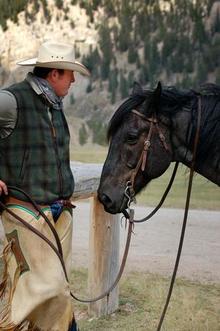According to the U. S. Department of Veterans Affairs, at least 20 percent of veterans suffer from PTSD and roughly 320,000 have experienced at least a mild concussion or traumatic brain injury in combat.

Absorbing the benefits of equine assisted therapy
Statistics show that Post Traumatic Stress Disorder affects about 7.7 million American adults in any given year and while there is no cure, early identification and treatment of PTSD symptoms with equine assisted therapy lessen the severity of the condition.
During Memorial Day weekend 2016, it became obvious from reports that Equine Assisted Therapy is helping many of these veterans regain their equilibrium as they interact with horses and attempt to normalize their lives after seeing action in war zones. In addition, many civilians with traumatic brain injuries are participating in effective equine therapy programs.
For example, retired Marine Kevin Sakaki who suffers from post-traumatic stress disorder, discovered that spending time with a retired race horse is helping him cope with the issues involved in returning to civilian life. He did not expect to find peace at a rural farm in Virginia, but like many men and women who have served in the military, he discovered that being around horses has a calming effect that carries over into other areas of his life.
"There is something peaceful about being around the horses. It's just really relaxing." Sakaki was diagnosed with PTSD after serving tours in both Iraq and Afghanistan. "I just had short temper but being a sergeant in the Marine corps, it's kind of that expectation that are you doing your job well when you are kind of on that edge a little bit," he said. "The problem was carrying that home."
Participating in the equine-assisted therapy program at Boulder Crest Retreat, veterans learn to manage stress and begin to feel at peace by walking and grooming the animals. The equine therapy is focused on building relationships and partnerships and making connections. It is not about being in control, and, rather than riding the horses, participants groom them, feed them, and, in general, spend relaxing time just being with the horses.
When army reservist Mike King returned from Iraq, he suffered from alcohol abuse and anxiety. He says spending time with the horses is calming. In addition to bonding with the horses, the retreat offers free stress recovery programs for veterans and their families. After spending about a week at the ranch, many veterans say they feel they are moving in the right direction.
Statistics show that Post Traumatic Stress Disorder affects about 7.7 million American adults in any given year and while there is no cure, early identification and treatment of PTSD symptoms with equine assisted therapy lessen the severity of the condition and improve the overall quality of life for veterans suffering from this condition according to veteranâs newsroom statistics.
In the U.S. alone, every year, over 125,000 individuals with traumatic brain injuries take advantage of equine assisted therapy which has shown to be effective in treating patients,including combat veterans, with PTSD, depression, anxiety, attention deficit/hyperactivity disorder, conduct disorders, dissociative disorders and other chronic mental illnesses.
At PATH Intl., which is a global authority, resource and advocate for EAAT, those activities may include therapeutic horseback riding, hippotherapy, carriage driving, interactive vaulting (similar to gymnastics on a horse), carriage driving, equine-facilitated psychotherapy and equine-facilitated learning. A physical, cognitive or emotional special need does not limit a person from interacting with horses. In fact, such interactions can prove highly rewarding.
More than 30 VA Medical Centers are participating in Equine Assisted Activities (EAA) programs all around the US as noted by the Supervisory Recreation Therapist Department of Veterans Affairs.
